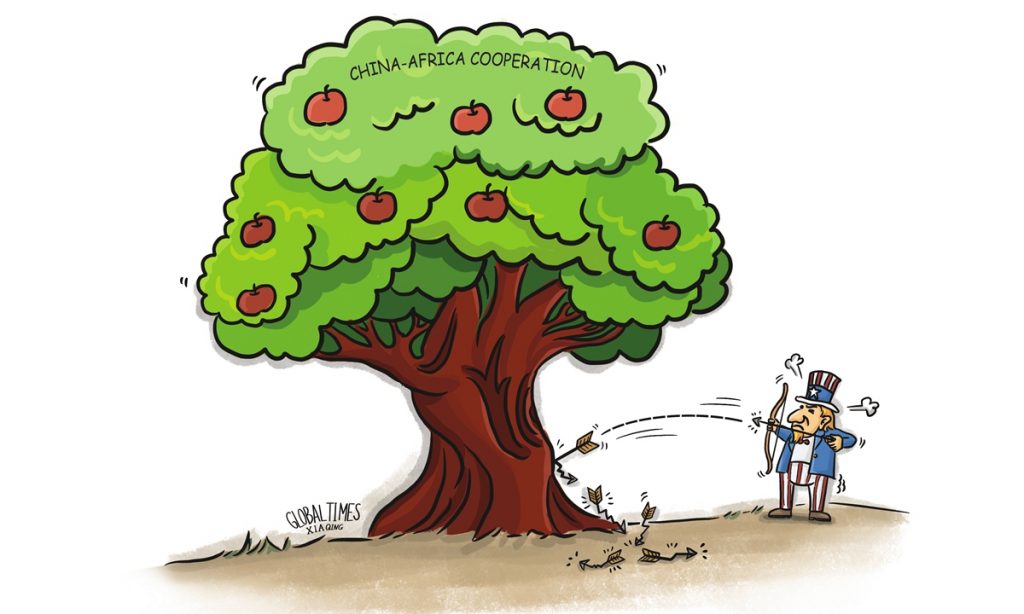Published: July 25,2023
By Song Wei

Illustration: Xia Qing/Global Times
The US should avoid “head-to-head” engagement with China in increasing engagement with African partners and focus on how to benefit African countries, US media Voice of America (VOA) said in a Chinese version report recently, citing analysts. The changed tone appears to call for a broader development partnership to support Africa’s development. However, tactical adjustments can hardly conceal the core of the US Africa strategy – still positioning China as an imaginary enemy and competitor.
The claim of “not viewing China as imaginary enemy” is nothing but a tactical adjustment. VOA said that the US should avoid launching adversarial competition with China because the US strategy to return to Africa came 20 years after China’s deep involvement in Africa’s infrastructure and mineral development industries. VOA’s suggested tactical adjustments, which were made on the basis of assessment of the US’ strength, are not giving up competition, but only removing the word “competition” from its slogan.
On the one hand, the US is worried that it may lose out in competition with China. From the perspective of the US, Africa is a resource-rich continent, and China has been deeply involved in Africa’s mining industry for many years.
According to research from US think tank the Brookings Institution, China has deep influence across the new-energy industrial chain, refining 68 percent of nickel globally, 40 percent of copper, 59 percent of lithium and 73 percent of cobalt. China’s footprint in the African mining industry is mainly concentrated in five countries: Guinea, Zambia, South Africa – an important hub for the mining industry and transportation and logistics, Zimbabwe – a major lithium mining country and the Democratic Republic of the Congo.
Through the Belt and Road Initiative (BRI), Chinese companies have invested in infrastructure construction and mine exploration in Africa. Although the US is concerned that China will become “the OPEC of key minerals,” and Washington, as a latecomer, does not have competitive edge in the domain in Africa. The best the US can do is “showing up.”
On the other hand, the US’ demand for Africa to choose sides has aroused strong resentment among African countries. The new Africa strategy released by the US last year clearly regards China and Russia as strategic rivals, and publicly accused some African countries of not taking sides with the US on the Ukraine crisis, causing widespread dissatisfaction in Africa. For this reason, the US had to start repairing its image. At the US-Africa summit at the end of last year, the US attempted not to give the nearly 50 African leaders attending the summit the impression that the driving force behind US’ return to Africa is to confront China.
The rhetoric of “the US will benefit Africa more” is intended to position new advantages. The VOA report said that the US should overcome China’s first-mover advantages in the African continent. First of all, the US admits that the business environment in Africa is not good, and American companies are not interested in competing with Chinese companies in the market. The Western allies of the US have a colonial history of hundreds of years as the former colonists of the African continent, and Western countries only consider plundering and have never upheld the idea of development cooperation. Against this backdrop, if the US wants to win the competition, it must find new areas of advantage in Africa. In fact, the US has struck beneficial timing – many African countries have begun to upgrade their economic construction goals, shifting from infrastructure construction to green technology, logistics and telecommunications industries.
The US Africa strategy has been driven by identifying and engaging with imaginary enemies. In recent years, the accelerated deepening cooperation between China and Africa has caused tensions in the US. Squeezing China out and building a pro-American regime are the core considerations of the US in Africa. A few months ago, the US government sent its largest-ever US delegation to the African Mining Indaba, hoping to win over Africa through building a “mine security partnership.” In addition, senior Biden administration officials, including Treasury Secretary Janet Yellen, visited Zambia during their recent trips to Africa to ensure that it does not fall behind in copper mining and exports.
Since the launch of the Forum on China-Africa Cooperation, China-Africa cooperation has gradually expanded and strengthened in various fields. Especially in 2018, African countries have applied to join the BRI, creating a closer community of shared future between China and Africa. The US’ suppression of China has also continued to escalate with groundless accusations like “debt trap.” At the same time, the US is also reflecting on its own strength and advantages, and a new competitive layout is beginning to unfold.
The author is a professor with School of International Relations and Diplomacy, Beijing Foreign Studies University. bizopinion@globaltimes.com.cn
 Africa -China Review Africa -China Cooperation and Transformation
Africa -China Review Africa -China Cooperation and Transformation
